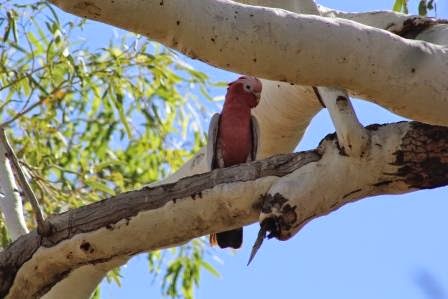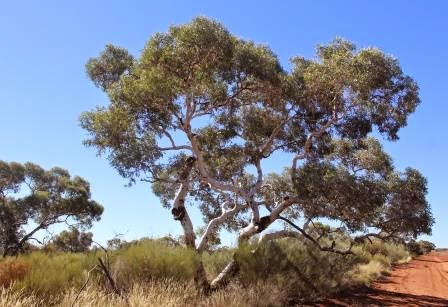Friday May 16
For
those of you who have stayed tuned, we have just had two nights in Leonora and have moved on to
Laverton today to start our trip east on the Great Central Road. It already seems ages since
we left the coast and despite our initial sadness we are now well and truly
back into the swing of loving these inland landscapes with their varied vegetation and environments.
As
planned, we left Coral Bay last Sunday morning and on reaching the road south
were horrified to see that the Minilya-Exmouth Road was still closed because of
water across the road further south. ‘Rats!’ we said (it was really much more
expressive than that!) as the need to go north to Burkett Road, then across to
the NW Coastal Highway before turning south added 160km to our journey. The drive
across to the Coastal Highway did, however, provide an opportunity to marvel
once again at and, in reality, remember, the incredible red sand hills that cover
the area. We were very impressed with the amount of water on the sides of the road
and the number of floodways. Once we were on the highway, there was even more
water alongside the road, so no wonder the recent rain had caused so much
havoc.
Another
advantage of the detour was that we were able to stop and check out the Lyndon
River – the very waterway which had covered the Minilya-Exmouth Road a little
further west and caused said detour! The river was still flowing quite quickly and it was very obvious
that it had been considerably higher than it now was.
 |
| This Galah was keeping a very close eye on me from its River Red Gum perch |
Finally
made it to Minilya Roadhouse and felt that we were truly underway. We spent
Sunday night at a roadside stop between Carnarvon and Geraldton and went in to ‘Gerro’
on Monday morning to stock up for the journey home. Monday night’s camp was at
the Milroy Nature Reserve near Mullewa and it gave us a magnificent chance to
familiarise ourselves with the huge grain and ore trains of the region, as the
railway line ran right by the side of this very small reserve!
 |
| Milroy Nature Reserve |
On Tuesday
we travelled further east, with water all along the sides of the road, through
Yalgoo and then on to Mount Magnet, the oldest operating gold mining settlement
in WA - alluvial gold was discovered here in 1891 by a bloke
looking for a lost swag. We spent the afternoon enjoying the 37km Tourist
Trail, which allowed us to see the remains of the goldrush era, current gold
mining operations (from a distance only!) and the amazing breakaways at The Granites.
 |
| Open cut gold mine |
 |
| Amphitheatre breakaway |
 |
| The Granites breakaway - the harder red granite has eroded to expose the soft white granite |
 |
| As above! |
 |
| The moon over the breakaway |
 |
| What great curly bark this acacia has! |
Wednesday’s
travel took us further east to Sandstone, listed as one of WA’s most
picturesque towns. Gold was discovered here in 1894 and its heyday before World
War One saw the streets busy with horse-drawn wagons and donkey and camel
trains and some 6,000 – 8,000 people. The current population of 42 must be very
proud of their town, as it is beautifully looked after and we enjoyed wandering
around looking at the historic buildings and the Gold and Wool Interpretive
Park.
 |
| The National Hotel - has operated continually since opening in 1907 |
As
we drove to Sandstone we noticed an occasional rounded, bright green tree which
stood out vividly from the surrounding grey Mulga and had to stop to check it out as it
looked so out of place in this dry environment. When Murray showed the lovely
lady in the Visitor Centre and Museum a leaf we had souvenired, she told us it
was a Desert Kurrajong.
Just
out of Sandstone is London Bridge (how many places have a London Bridge and I bet there is a beautiful Aboriginal name for this place!), a
remarkable 350 million year old weathered basalt formation which is part of a
larger breakaway. More magnificent colours.
Between
Sandstone and Leinster we had a great time identifying some of the trees we
were seeing along the way using the little 'Trees of the Goldfields' book I bought at
the Visitors Centre. Because of the recent rain, things were looking quite
green and we were surprised at the amount of vegetation.
 |
| Marble Gum - the signature tree of the desert and the largest eucalypt found in WA's deserts |
 |
| Marble Gums with a swathe of epicormic shoots after a fire |
From
Leinster we drove south to Leonora, our goal for the day and the last ‘big’
town before Laverton and the Outback Way.
On
Thursday we fulfilled a dream I have harboured since our last trip to WA
and did a 300km round trip south to Lake Ballard, 51km west of the northern
Goldfields town of Menzies, to see the 'Inside Australia' art installation.
British artist Antony Gormley used 3D scans of the inhabitants of Menzies to
create 51 sculptures cast in a stainless steel alloy containing iron, chromium,
nickel and trace elements of vanadium and titanium oxide from Lake Ballard. These
materials are all found in the Achaean rock of WA.
The
sculptures are spread over 10 square kilometres in Lake Ballard, a large and
usually dry salt lake. It was just amazing – the sculptures themselves were
fantastic, but the setting made it truly stunning and worth every centimetre of
the drive. The recent rain meant that were was water in some parts of the lake, which added enormously to the beauty of the installation.
 |
| Lake Ballard |
 |
| Another wonderful native tree - the inland weeping form of Native Willow (Pittosporum angustifolium) |
 |
| The gorgeous orange fruit of the Native Willow |
On
our way back to Leonora we were excited to see a Wedge-tailed Eagle feeding on
a dead kangaroo by the side of the road. When we turned around and went back so
I could try for a photos, it took off but luckily landed in a nearby tree, from
where it gave every appearance of glaring at us for disturbing its meal.
 |
| A lucky shot as it got sick of being stared at and decided to swap trees |
We called
in to the Gwalia historic site just south of Leonora, the residents of which were
immigrant workers who came to Australia from Italy and Yugoslavia in search of
a better life. It became a ghost town virtually overnight when the ‘Sons of
Gwalia’ gold mine, the first manager of which was Herbert Hoover (later to
become 31st President of the USA) closed in 1963. We wandered
through the old miners’ cottages, taking lots of photos to share with our
neighbour Laurie, who lived in Gwalia as a kid. It was amazing to think about
this as we walked around.
 |
| Open cut mine at Gwalia |
 |
| Lots of people lost their beds to make this fence! |
On Thursday
evening we were a bit nervous as the weather forecast during the day was for storms and
rain, which could muck up all our plans. It did rain a little overnight and when we left Leonora this morning things did look a little ominous. We were very positive though that it would all be fine by the time we reached Laverton, where I had planned to take one last photo of us by a sign for the Great Central Road, stick it on this post and publish it, as I had loaded everything else last night.
Trouble was, it rained off and on most of the way to Laverton and by the time we had organised our permits for the WA and the Northern Territory sections of the trip at the Visitors Centre, fuelled up and had a coffee it was raining much more heavily, so we just took off and I forgot all about my blog update! We have travelled 303 kilometres along the route, the rain stopped after about 120km, the road conditions improved greatly at the same time (although they had not been too terrible) and we are spending the night at Tjukayirla Roadhouse, where I have bought some WIFI so I can publish this update.
Whew - will do a much better description of this part of our trip next time and add some photos, but will get this finished and published before I run out of time!!!!!















Every new entry to your blog brings about lots of exclamations about the wonder and beauty of nature. The explanations and the truly spectacular photography have made this trip the greatest pleasure to share. There were many photos that made me want to go and 'feel' for myself. But certainly, these are places I'd have never known about at all if it were not for your adventurous spirits. Thanks heaps! I'm looking for the next episode, just the same. I can't imagine a "better description" but I await the promised additions. My girls are loving your photos. Fascinating about Herbert Hoover! An Australian Mining Magnate! I wonder if there were cries from "birthers" when he was elected. Oh yeah - he wasn't black, so of course not.
ReplyDeleteditto Wendy, and a few Drysdale looking photos in there plus one of Murray`s impersonation, holding up a London Bridge rock formation! Those rocks look like they still have some gold left in them by the colors. Just superb photos, every single one. Yeah! that`s amazing about Herbert Hoover, probably Chinese lol. gorgeous cheeky galah too. My niece has a pet one which she has taught to do tricks, they are really smart.
ReplyDeleteEvening Wendy and Squires.
ReplyDeleteHave just finished the update, although I am still behind! It is my own fault as I keep saying that I am not going to write much this time so I can do it more quickly, but that never seems to work - I do get a bit carried away!
Not long left of our trip now - seems incredible that I am suddenly writing about the end. Till next time . . .
Heather xx